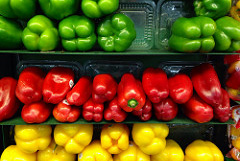Reducing harm through food and work: incorporating food security and peer employment in harm reduction programming
Keywords:
Foodscapes, Harm reduction, Social services, Poverty, Urban geography, Greater VancouverAbstract
Food is usually provided in harm reduction settings, like needle exchanges, low-barrier shelters, and drug consumption rooms. These spaces are often staffed by people who use drugs (PWUD) and/or living with HIV/AIDS (PLWHA) who serve their peers. Yet, there is little comprehensive discussion of how food and peer work fit into organizations with a harm reduction orientation (OHRO) for low-income PWUD/PLWHA. Drawing on 27 semi-structured interviews with OHRO in Greater Vancouver, Canada, this thesis explores the variegated regional landscape of food, peer work, and harm reduction using literatures on harm reduction, poverty management, the shadow state, and foodscapes. Results demonstrate that OHRO are important nodes in low-income PWUD/PLWHA foodscapes, but that they do not systematically integrate food programming with their harm reduction philosophies. Similarly, peer employment is widespread, but organized in ways that can compromise harm reduction goals. I conclude with recommendations to improve food access, and employment for PWUD/PLWHA.




